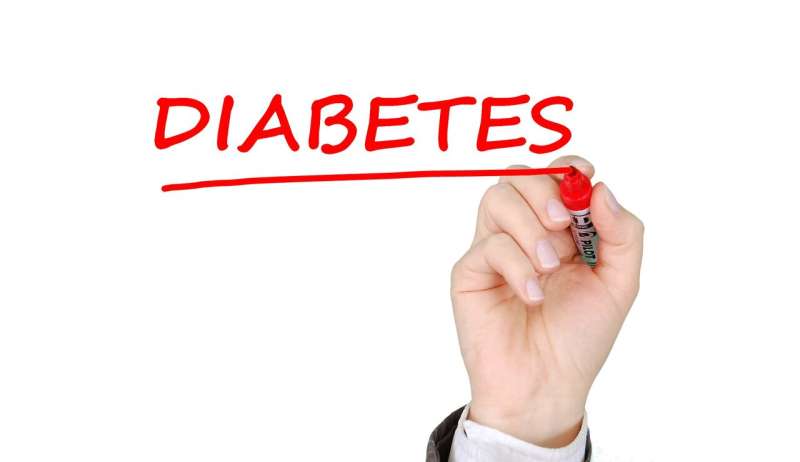Obesity contributes to up to half of new diabetes cases annually in the United States

Reducing the prevalence of obesity may prevent up to half of new Type 2 diabetes cases in the United States, according to new research published today in the Journal of the American Heart Association, an open access journal of the American Heart Association. Obesity is a major contributor to diabetes, and the new study suggests more tailored efforts are needed to reduce the incidence of obesity-related diabetes.
Type 2 diabetes is the most common form of diabetes, affecting more than 31 million Americans, according to the U.S. Centers for Disease Control and Prevention. The risk factors for Type 2 diabetes include being overweight or having obesity; being over the age of 45; having an immediate family member diagnosed with Type 2 diabetes; being physically active less than 3 times per week; or a history of gestational diabetes (diabetes during pregnancy). Type 2 diabetes is more common among people who are Black, Hispanic or Latino, American Indian, Alaska Native, Pacific Islander or Asian American.
The number of deaths due to Type 2 diabetes in people younger than 65 is increasing along with serious complications of the condition, including amputations and hospitalizations. In addition, Type 2 diabetes impacts heart disease and stroke risk: adults with Type 2 diabetes are twice as likely to have a heart attack or stroke than people without diabetes.
Type 2 diabetes can be prevented or delayed with healthy lifestyle changes, such as losing weight, eating healthy food and being physically active. According to the National Diabetes Prevention Program, behavior changes have been shown to help people with prediabetes lose 5% - 7% of their body weight and reduce their risk of developing type 2 diabetes by 58% (71% for people older than age 60). Researchers examined the prevalence and excess risk of Type 2 diabetes associated with obesity.
"Our study highlights the meaningful impact that reducing obesity could have on Type 2 diabetes prevention in the United States. Decreasing obesity needs to be a priority. Public health efforts that support healthy lifestyles, such as increasing access to nutritious foods, promoting physical activity and developing community programs to prevent obesity, could substantially reduce new cases of Type 2 diabetes," says the study's first author Natalie A. Cameron, M.D., a resident physician of internal medicine at the McGaw Medical Center of Northwestern University in Chicago.
Researchers used information from the Multi-Ethnic Study of Atherosclerosis (MESA) and four pooled cycles (2001-2016) of the National Health and Nutrition Examination Survey (NHANES). MESA is an ongoing, longitudinal study of 45 to 84-year-olds who did not have cardiovascular disease upon recruitment. MESA data included in this study was collected during five visits from 2000 to 2017 at six centers across the U.S. NHANES is a cross-sectional study of the American population that takes place every other year using patient questionnaires and examination data.
For this analysis, authors limited data to participants ages 45 to 79-years old. They included only those who were non-Hispanic white, non-Hispanic Black or Mexican American and who did not have either Type 1 or Type 2 diabetes at the beginning of the study. Researchers calculated both the prevalence of obesity and the excess risk of Type 2 diabetes associated with obesity.
The study's findings include:
- Among NHANES participants, the overall prevalence of obesity increased from 34% to 41% and was consistently higher among adults with Type 2 diabetes.
- Among MESA participants
- about 1 in 10 (11.6%) developed Type 2 diabetes after nine years.
- People with obesity were nearly three times as likely to develop Type 2 diabetes compared to those without obesity (20% vs. 7.3%, respectively).
- In both the MESA and NHANES groups:
- Obesity was linked to the development of Type 2 diabetes in 30 – 53% of cases.
- a greater proportion of participants with obesity had an annual family income of less than $50,000, and they were more likely to be non-Hispanic Black or Mexican American.
- Obesity prevalence was the lowest among non-Hispanic white females, however, this group experienced the highest obesity-related Type 2 diabetes.
"Our study confirms there is a higher prevalence of obesity among non-Hispanic Black adults and Mexican-American adults compared to non-Hispanic white adults. We suspect these differences may point to important social determinants of health that contribute to new cases of Type 2 diabetes in addition to obesity," says Cameron.
"Additionally, the obesity epidemic has collided with the COVID-19 pandemic," says Sadiya S. Khan, M.D., M.Sc., the study's senior author and an assistant professor of medicine and preventive medicine at Northwestern University's Feinberg School of Medicine. "The greater severity of COVID-19 infection in individuals with obesity is concerning because of the growing burden of adverse health consequences they could experience in the coming years; therefore, further efforts are needed to help more adults adopt healthier lifestyles and hopefully reduce the prevalence of obesity."
This analysis included only middle-aged to older adults without cardiovascular disease who were non-Hispanic white, non-Hispanic Black or Mexican-American, so results may not be generalizable to the entire U.S. population. Future research is required to assess the burden of obesity on new cases of Type 2 diabetes in other age groups and racial and ethnic groups.




















